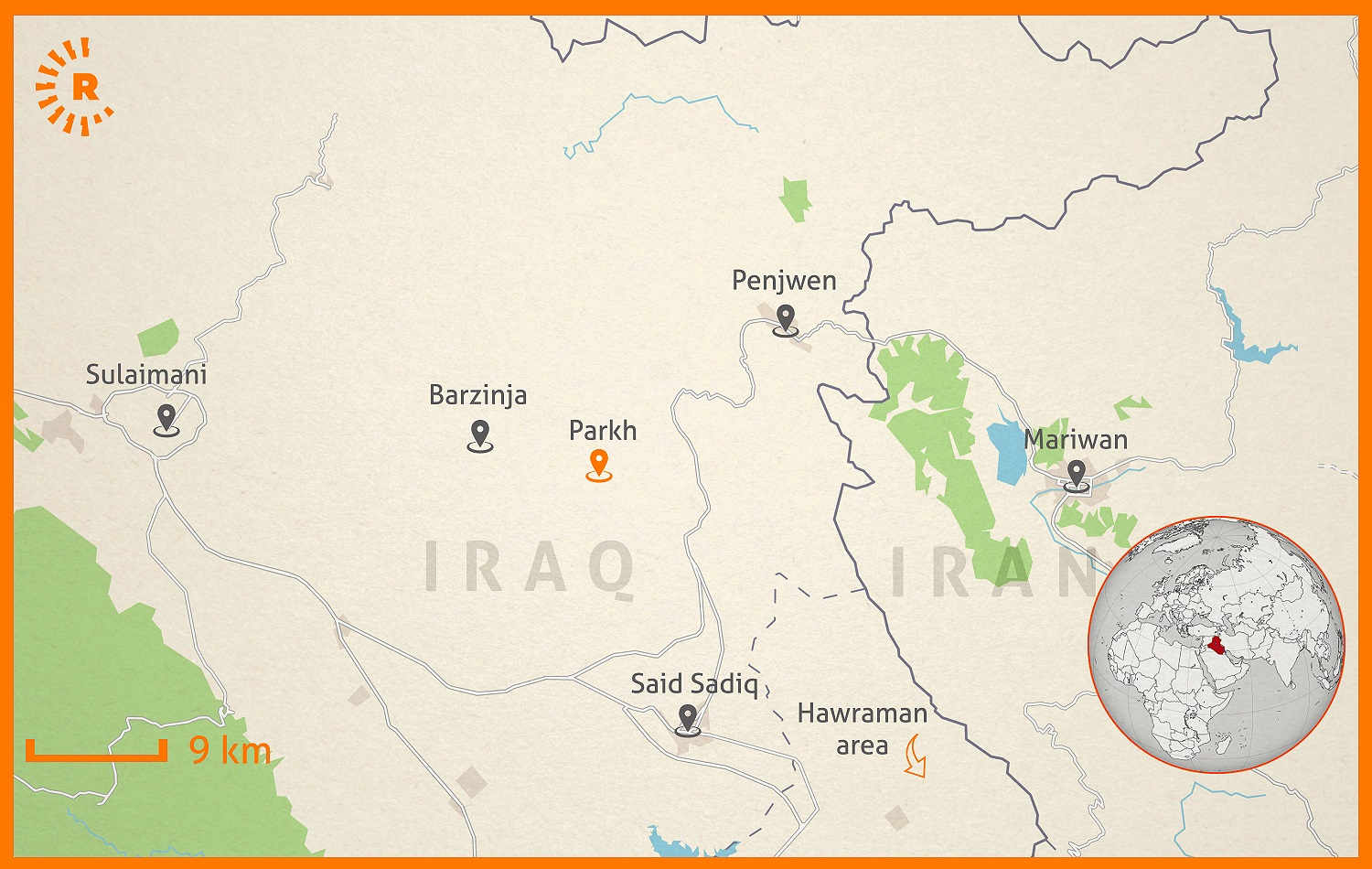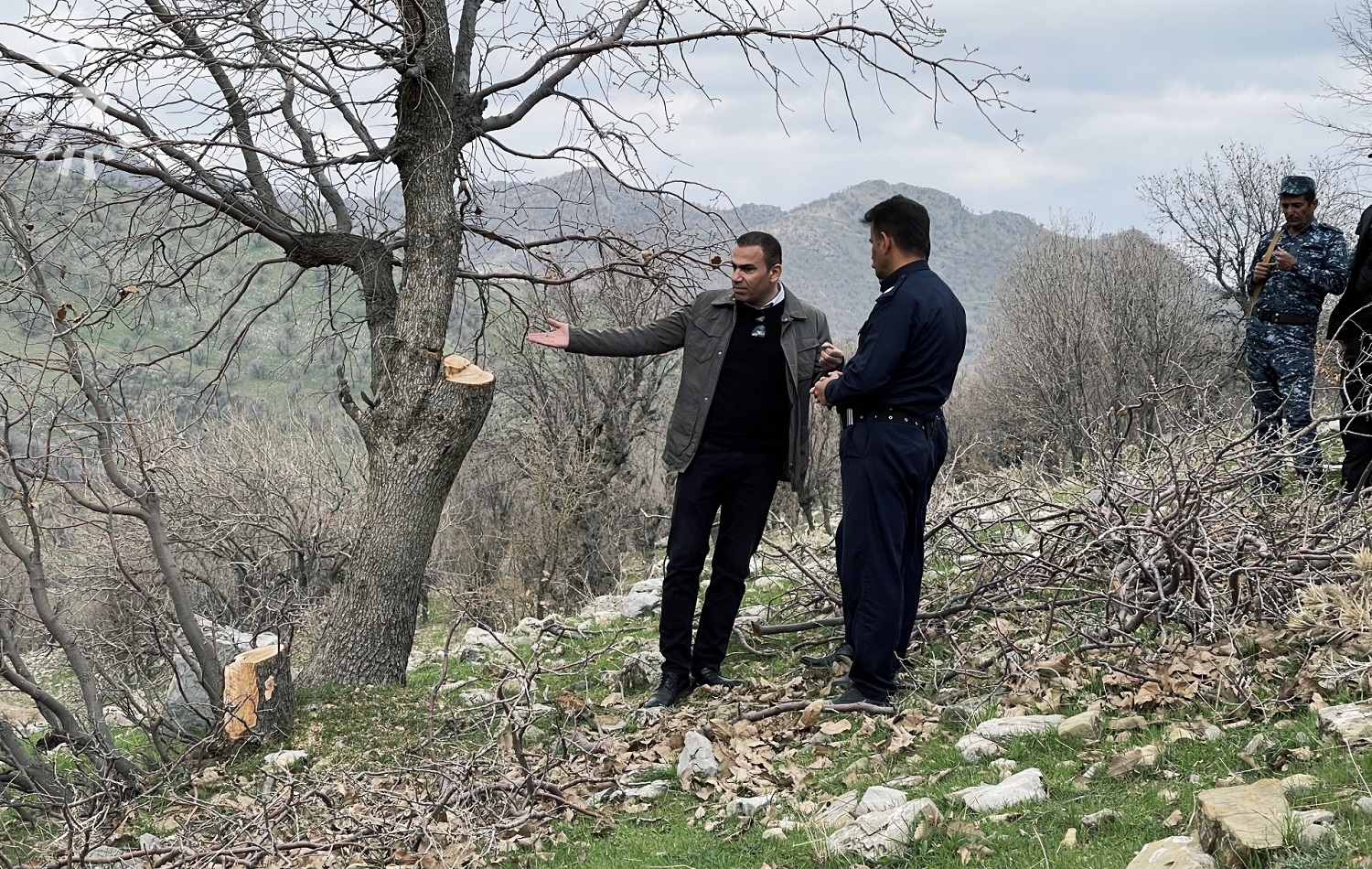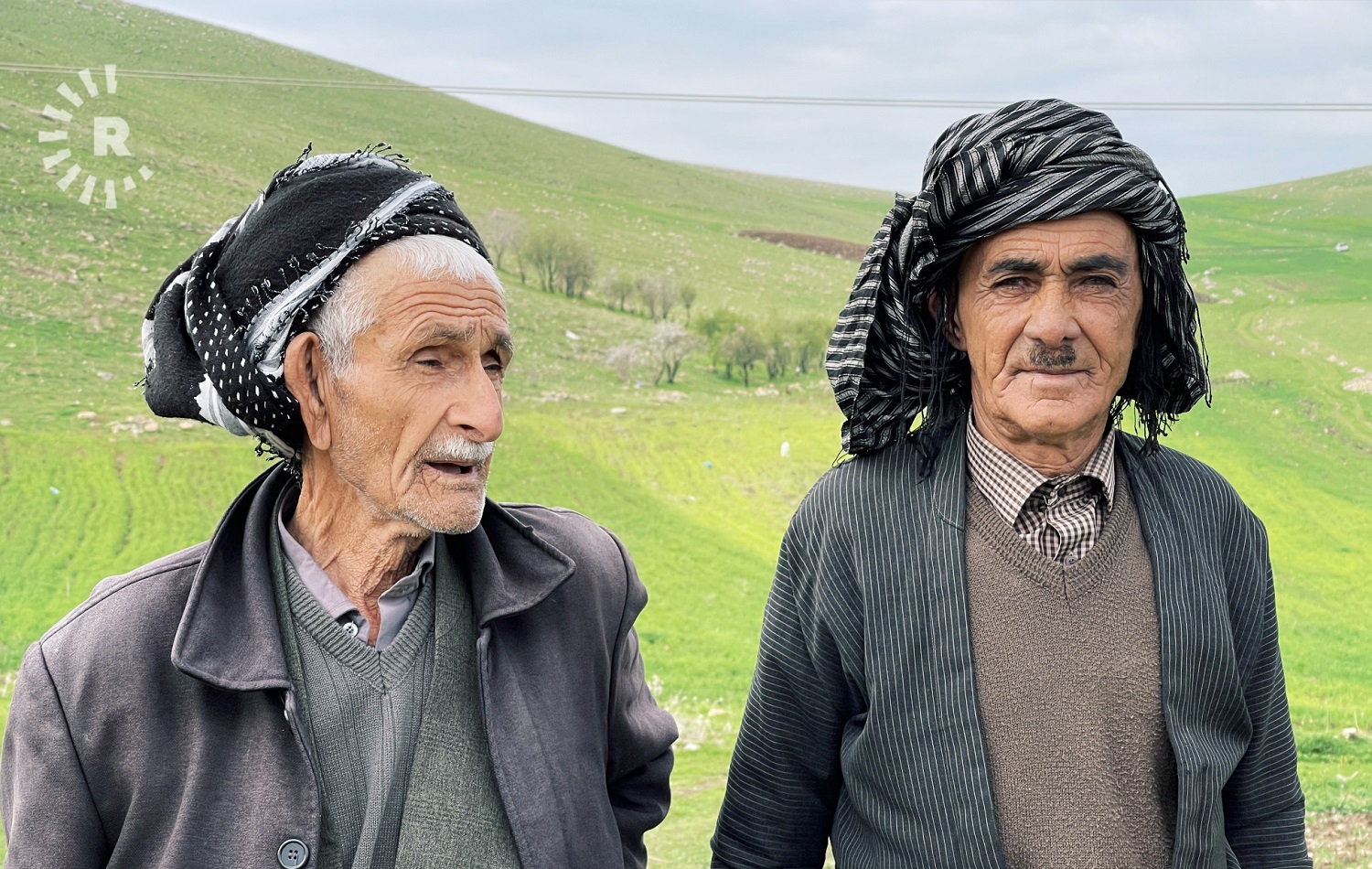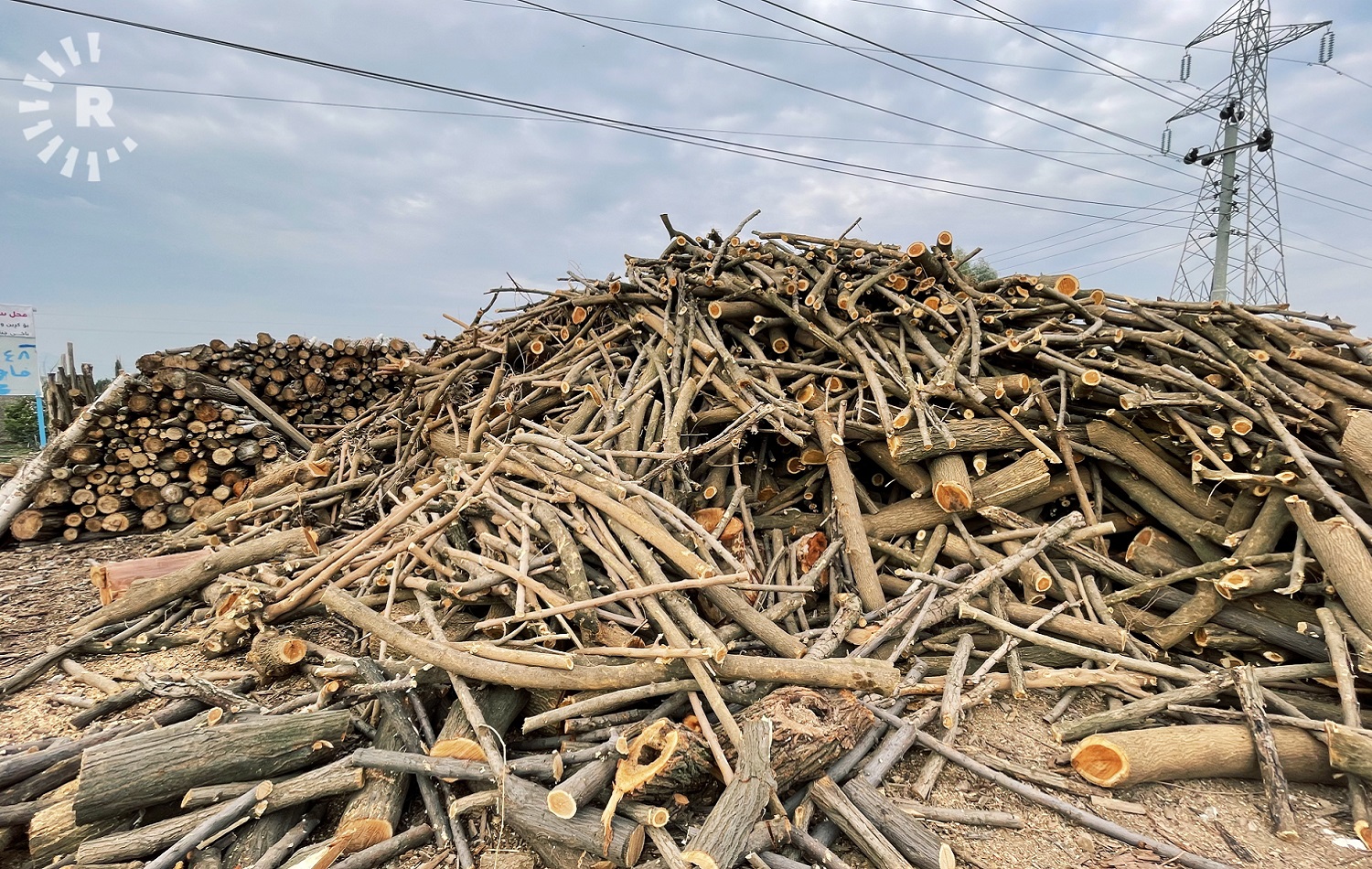BARZINJA, Kurdistan Region — Two restless baby squirrels cannot stay in their den anymore, no matter how hard the forest police officer tries. With their mother lost or perhaps killed, the third kit hides under the cavity of the oak tree trunk. The three were seized from a young Kurdish shepherd and his friend, who had taken them out of their home by cutting the den open with an axe.
As the rodents frisked under the tree’s trunk, a group of five officers from the Environment and Forest Police, AK-47s slung over their shoulders, look on in bewilderment, the stumps of a dozen freshly cut oak trees surrounding them.
An environmental tragedy is unfolding in the famed oak tree forest in the mountains of Barzinja, east of the city of Sulaimani. Villagers and full-time loggers are cutting the trees down in unprecedented numbers, depriving the land of the animals that were the very reason for the existence of the forest in the first place.
Osman Hama Ali, a resident of Barzinja’s Parkh village, inspects three freshly cut tree trunks. “They must have cut these trees at night,” he said.
Ali is sad and angry about the wildlife and the forest disappearing around him, but knows that in the current circumstances, it is a losing battle. “I want to have a [police] patrol in this area all the time,” he said.
As homes for birds were torn down, their chirps became so quiet that all that could be heard was the thud of squirrels jumping from one tree to another – but even that can no longer be heard, Ali said; “the wildlife is disappearing too.”

The responsibility of protecting the forests where Osman Hama Ali has lived for all 55 years of his life falls on the shoulders of Major Sardar Ahmad Rashid, the head of the Environment and Forest Police in Said Sadiq district. Officer Hiwa Aziz Kakakhan, responsible for the Barzinja area, is under Rashid’s command.
“It is impossible to patrol this area, because we have nothing except for pick-up trucks that can’t travel on these roads,” said Major Sardar. “Some of the trees cut down are over 50 years old, and mostly on the peaks – we can’t reach there.”
Major Sardar accompanied a Rudaw team that travelled throughout the Barzinja area, where they found scores of sites where charcoal is processed, distinguishable from the rest of the landscape by a clay oven that consumes the living trees to make charcoal to fuel grills for kebab, cafe stoves for tea.
“There are over 40 ovens in Parkh village alone,” he said, as four accompanying officers began destroying some of the burning ovens. “If you travel from Parkh to Penjwin, there are over 200 ovens. They use freshly cut trees because they say their charcoal is better.”

The economic crisis that hit the Kurdistan Region in 2014, the devastating three-year war with Islamic State that followed, and a collapse in the price of oil have all caused unemployment and poverty to soar.
“Since 2014, we have been given around 60 litres of petrol for each pickup per month,” Officer Kakakhan said. “We sometimes have to pay for petrol from our own pockets.” He said he used to receive over 300 litres of petrol prior to 2014, which was more than enough to patrol the mountains.
The area for which Officer Aziz is responsible is so wide and so rugged that he barely manages to visit its villages once a month. When he does, and tries to stop the villagers, they either fire upon him or place spikes on the road to puncture his car tires. “When we arrive at the village, the men often hide and sometimes the women start throwing stones and pebbles at us,” Major Sardar said.
Another source of headache for the police is the court system, with powerful officials sometimes intervening to prevent punishment for crimes from taking place – an affair too familiar in other parts of the Kurdistan Region.
Driving through the villages, the ovens or processing plants where charcoal is made are in open sight. Tons of fresh wood cut from the forest ready to be turned to charcoal and sold for 14,000 dinars ($9.60) per flour sack is available. Middlemen sell a sack to holidaymakers for around 25,000 dinars ($17).
“On one occasion, we caught a load of freshly cut wood but by the time we managed to convince a judge and to get a tractor from another force to carry the load, it was gone,” Major Sardar Ahmad said with a sigh, the dirt roads in the area so uneven that it is practically impossible to reach the villages without an off-road pick-up truck with trail control.
Travelling across the Sulaimani province, including to the Hawraman region, it is unavoidable to see the loads of freshly cut woods being processed for making tea and kebab. The loggers often have better equipment than the forest police.

“I went to this mountain and cut wood, but the police arrived and chased me away across the mountains,” said Rebin, a young man from Halabja in his early twenties attending the tea house next to his father’s kebab shop in Hawraman. “It was the only day that I did not take my pick-up to bring down the woods from the mountains, otherwise they would have seized my car.”
Asked why he did not use the twigs or the branches of the trees, he said that they were not of use; instead, the trunk or the base make good charcoal for kebab and tea.
The locals and the elderly are disappointed in what they see as a way of life disappearing. Many songs in Kurdish speak about the mountains, the trees and the birds.
From the village of Qaweela, one of the closest villages in the Barzinja area to the town of Said Sadiq, it is visible to the naked eye that the forest is receding.
“We used to see wild goats and partridges in these hills and mountains,” said Ali Kaka Awla, in his early sixties and from Qaweela. “The hunting continues and the wildlife is gone.”

While thousands of oak trees turn to smoke, their ashes scattered across the region, some are reaping the benefits 90 kilometers away, at the infamous “under the bridge” bazaar for wildlife in Sulaimani’s city centre.
Rezhwan, in his early twenties, is trying to convince customers to buy a female baby squirrel for 55,000 dinars ($34). “It is 55,000, but you can have it for 50,000,” Rezhwan told an undercover Rudaw reporter on Saturday. “We took from a tree in Sitek,” he said, referring to an area north of Sulaimani city.
Next to Rezhwan a middle-aged man had two baby squirrels on display. “I bought them for 18,000 each and I sell them for 20,000 ($12) each,” the middle-aged man told the undercover Rudaw reporter. Asked where they got the kits from, the man responded: “I am not sure maybe they are from Hawraman.”
Additional reporting by Ranj Sangawi and Dilan Sirwan



